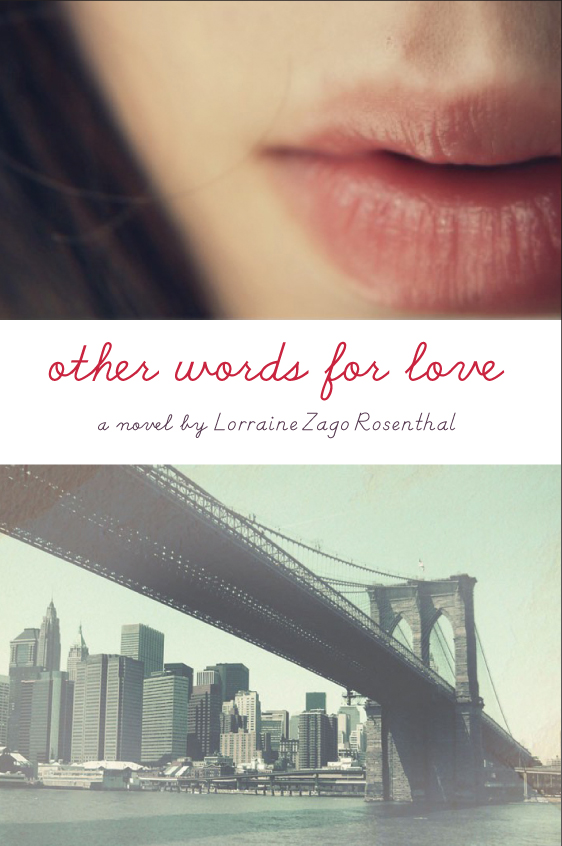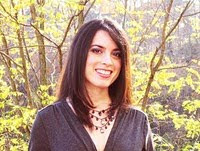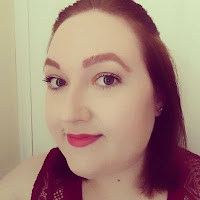As some of you may know I’m a huge fan and supporter of Other Words for Love a fantastic 2011 debut by the lovely and talented Lorraine Zago Rosenthal. Lorraine was kind enough to stop by the blog today to answer some questions about Other Words for Love. This book was my book of the month for January and has received plenty of praise already across the blogosphere but for those of you who are new to this book here’s a little bit about what it’s about :)

"When an unexpected inheritance enables Ari to transfer to an elite Manhattan prep school, she makes a wealthy new friend, Leigh. Leigh introduces Ari to the glamorous side of New York--and to her gorgeous cousin, Blake. Ari doesn't think she stands a chance, but amazingly, Blake asks her out. As their romance heats up, they find themselves involved in an intense, consuming relationship. Ari's family worries that she is losing touch with the important things in life, like family, hard work, and planning for the future.
When misfortune befalls Blake's family, he pulls away, and Ari's world drains of color. As she struggles to get over the breakup, Ari must finally ask herself: were their feelings true love . . . or something else?"
Interview with Lorraine
Welcome to Jess Hearts Books Lorraine!
Thanks so much, Jess!
 1.) How did you come up with the idea for Other Words for Love?
My characters are what inspire me most, and the idea of Ari and her family was the genesis of this novel. I was also inspired by the concept of “limerence,” which pertains to the intense emotional highs and lows a person can experience when involved in a romantic relationship.
2.) Other Words for Love is set in the 80's, why not present day?
There are a few reasons why I chose to set the story during the 1980s. First of all, the 1980s are a neglected era in YA fiction. The only other YA novel I know of that is set during this decade is The Carrie Diaries. There is YA fiction set in the 1800s, 1920s, etc., so why not the 1980s? This decade is as valid historically as any other, and I believe that no time period should be restricted from the YA genre. There are stories to tell from the viewpoint of young people in every era.
I thought that if teens could identify with historical fiction—time periods with cultures and values so different from now—then they could easily relate to a time period that they didn’t live through but wasn’t all that long ago. The ideals of the 1980s weren’t exactly the same as today, but they weren’t completely different, either. I also thought that adults who read YA fiction and lived through the 1980s might connect with the story.
But the main reason I set Other Words for Love in the 1980s is that the story wouldn’t work in the present day. As I mentioned, culture and values weren’t radically different then, but they weren’t exactly the same as today. For example—in the novel, Ari’s sister has a baby when she is seventeen years old, and although teen pregnancy isn’t encouraged now, I think it has less of a social stigma than it had during the 80s. There was no “Teen Mom” on MTV back then! Ari is more embarrassed about her sister having been a teen mother than she might be today, and Evelyn’s choices are extremely disappointing to her parents.
Also, the issue of AIDS is prevalent throughout the novel. Although AIDS unfortunately still exists, it is better understood than it was during the 80s, when it was new and many people didn’t fully comprehend how it could be contracted. There was an undercurrent of hysteria when AIDS first appeared, and this is present in Other Words for Love.
Finally, although Ari is intelligent and mature, she’s also more innocent than most girls her age would be today—for various reasons. For example, the internet didn’t exist during the 1980s, so teens didn’t have as much access to information as they do now. The 1980s were more conservative than the present time—just take a look at how teens were represented in the media back then as opposed to now.
3.) Were any parts of Other Words for Love hard to write? Did you use any of your experiences as a teen to write this book?
I wouldn’t say that it was difficult to write Other Words for Love, but it was certainly challenging because my goal was to create characters with complex personalities and traits that aren’t all positive or all negative. Blake’s brother, Del, was a challenging character to develop because there are so many sides to him. He’s a slick womanizer and the black sheep of his family, but he’s also emotionally wounded from his mother’s death and because he knows that his father doesn’t approve of him. He’s envious of Blake and has a hard time hiding it, and yet he cares about Blake, too. He also sees Blake’s flaws when other people—especially Ari—overlook them. He does some things that Ari finds surprising.
The most challenging aspect of writing this novel was getting inside the mind of the main character. So much of what takes place in the story has to do with Ari’s feelings and perceptions, and it was therefore necessary to unearth the reasons why she feels and perceives things as she does. We are all the product of our experiences, and I wanted Ari’s actions and reactions to make sense based on her experiences. In order to depict this in a credible way, I had to create her life—her interactions with her family, her friends, and her peers—in a manner that would explain why she is so affected by her relationship with Blake. Another challenging aspect was portraying Blake as a sympathetic character even though he ends up damaging Ari. He also required a strong back-story to explain his actions.
Regarding my own experiences, I think that all authors use their experiences in their writing. Some of what we write is based on experience; some is experience mixed with imagination; and some is pure fiction. Like Ari, I grew up in New York and went to a prep school, so that is one aspect of the novel that reflects my experiences. Also, I think that many of the things Ari goes through and feels are universal—we’ve all been there in one way or another.
4.) Did you do any kind of research before or during writing?
Yes, I did a lot of research before and during writing Other Words for Love. There were several elements of the story that required research. As I previously mentioned, an aspect of the novel is the concept of “limerence,” which is when a person has extremely strong love/lust/infatuation for someone else, has high hopes and expectations for the relationship, and goes through a painful crash of depression if things don’t work out. Limerence causes very high and very low emotions. It’s a psychological phenomenon, and I researched it before writing the novel. I also researched post-partum depression, which Ari’s older sister deals with in the story. Additionally, I had to research details relating to the setting, time period, and other real-life references that appear in the story. Fortunately, Random House has very efficient copyeditors and proofreaders who fact-checked everything!
5.) Why did you want to write about first love and the highs and lows that go along with it?
Like many writers, ideas often just pop into my mind, and this novel is no exception. For a long time before I began writing OTHER WORDS FOR LOVE, I carried around the idea of a teenage girl who is deeply affected (positively and negatively) by her first serious relationship. Then I had the idea for Ari’s character, and I put the story and character together. I knew that Ari would be perfect for the storyline. This type of story wouldn’t work with a girl who is older and/or more sophisticated, because Ari’s inexperience is one of the things that causes her to react so strongly to the good and bad things that happen with her boyfriend, Blake. Because Blake is Ari’s first love, everything that goes along with her interactions with him is new and deeply felt and highly emotional. I wanted to write about a girl who goes through a very difficult time because of her first love, but who learns and grows from it.
6.) Why do you write for teens above all other genres?
I write in the YA genre because I love creating realistic stories that feature teen protagonists. The teen years are an exciting, frustrating, and complicated time that contain rich material for an author and can spark many story ideas. I enjoy creating teen characters and watching them change and grow. Writing YA is also great because it’s read by such a wide audience—people of all ages enjoy YA fiction.
7.) What do you hope readers take away with them after reading Other Words for Love?
When I write, I don’t have an agenda. I just tell one person’s story—in this case, Ari’s story. Fiction is extremely subjective, and people analyze and judge it based on their personal experiences and values. Because of that, every reader will take something different from my novel. However, if there’s one message that I think readers—especially teen readers—might take from Ari’s story is that your existence won’t always be exactly as it is now. Young people don’t have enough experience to know that life is always in flux, and circumstances constantly change. So even if you’re not particularly popular or happy or appreciated at the moment, it won’t always be that way. What makes you different now will make you special later. I also think that Ari’s experience in Other Words for Love demonstrates that even if things don’t work out the way you expected, you will be okay—and maybe even better.
8.) Are you working on anything at the moment? If so can you tell us a little bit about it?
Yes, I’m currently working on another YA novel that is set in NYC. The story and main character are different from Other Words for Love, but the novel also deals with love, family, and other relationships.
9.) Describe Other Words for love in 3 words.
Ari grows up.
1.) How did you come up with the idea for Other Words for Love?
My characters are what inspire me most, and the idea of Ari and her family was the genesis of this novel. I was also inspired by the concept of “limerence,” which pertains to the intense emotional highs and lows a person can experience when involved in a romantic relationship.
2.) Other Words for Love is set in the 80's, why not present day?
There are a few reasons why I chose to set the story during the 1980s. First of all, the 1980s are a neglected era in YA fiction. The only other YA novel I know of that is set during this decade is The Carrie Diaries. There is YA fiction set in the 1800s, 1920s, etc., so why not the 1980s? This decade is as valid historically as any other, and I believe that no time period should be restricted from the YA genre. There are stories to tell from the viewpoint of young people in every era.
I thought that if teens could identify with historical fiction—time periods with cultures and values so different from now—then they could easily relate to a time period that they didn’t live through but wasn’t all that long ago. The ideals of the 1980s weren’t exactly the same as today, but they weren’t completely different, either. I also thought that adults who read YA fiction and lived through the 1980s might connect with the story.
But the main reason I set Other Words for Love in the 1980s is that the story wouldn’t work in the present day. As I mentioned, culture and values weren’t radically different then, but they weren’t exactly the same as today. For example—in the novel, Ari’s sister has a baby when she is seventeen years old, and although teen pregnancy isn’t encouraged now, I think it has less of a social stigma than it had during the 80s. There was no “Teen Mom” on MTV back then! Ari is more embarrassed about her sister having been a teen mother than she might be today, and Evelyn’s choices are extremely disappointing to her parents.
Also, the issue of AIDS is prevalent throughout the novel. Although AIDS unfortunately still exists, it is better understood than it was during the 80s, when it was new and many people didn’t fully comprehend how it could be contracted. There was an undercurrent of hysteria when AIDS first appeared, and this is present in Other Words for Love.
Finally, although Ari is intelligent and mature, she’s also more innocent than most girls her age would be today—for various reasons. For example, the internet didn’t exist during the 1980s, so teens didn’t have as much access to information as they do now. The 1980s were more conservative than the present time—just take a look at how teens were represented in the media back then as opposed to now.
3.) Were any parts of Other Words for Love hard to write? Did you use any of your experiences as a teen to write this book?
I wouldn’t say that it was difficult to write Other Words for Love, but it was certainly challenging because my goal was to create characters with complex personalities and traits that aren’t all positive or all negative. Blake’s brother, Del, was a challenging character to develop because there are so many sides to him. He’s a slick womanizer and the black sheep of his family, but he’s also emotionally wounded from his mother’s death and because he knows that his father doesn’t approve of him. He’s envious of Blake and has a hard time hiding it, and yet he cares about Blake, too. He also sees Blake’s flaws when other people—especially Ari—overlook them. He does some things that Ari finds surprising.
The most challenging aspect of writing this novel was getting inside the mind of the main character. So much of what takes place in the story has to do with Ari’s feelings and perceptions, and it was therefore necessary to unearth the reasons why she feels and perceives things as she does. We are all the product of our experiences, and I wanted Ari’s actions and reactions to make sense based on her experiences. In order to depict this in a credible way, I had to create her life—her interactions with her family, her friends, and her peers—in a manner that would explain why she is so affected by her relationship with Blake. Another challenging aspect was portraying Blake as a sympathetic character even though he ends up damaging Ari. He also required a strong back-story to explain his actions.
Regarding my own experiences, I think that all authors use their experiences in their writing. Some of what we write is based on experience; some is experience mixed with imagination; and some is pure fiction. Like Ari, I grew up in New York and went to a prep school, so that is one aspect of the novel that reflects my experiences. Also, I think that many of the things Ari goes through and feels are universal—we’ve all been there in one way or another.
4.) Did you do any kind of research before or during writing?
Yes, I did a lot of research before and during writing Other Words for Love. There were several elements of the story that required research. As I previously mentioned, an aspect of the novel is the concept of “limerence,” which is when a person has extremely strong love/lust/infatuation for someone else, has high hopes and expectations for the relationship, and goes through a painful crash of depression if things don’t work out. Limerence causes very high and very low emotions. It’s a psychological phenomenon, and I researched it before writing the novel. I also researched post-partum depression, which Ari’s older sister deals with in the story. Additionally, I had to research details relating to the setting, time period, and other real-life references that appear in the story. Fortunately, Random House has very efficient copyeditors and proofreaders who fact-checked everything!
5.) Why did you want to write about first love and the highs and lows that go along with it?
Like many writers, ideas often just pop into my mind, and this novel is no exception. For a long time before I began writing OTHER WORDS FOR LOVE, I carried around the idea of a teenage girl who is deeply affected (positively and negatively) by her first serious relationship. Then I had the idea for Ari’s character, and I put the story and character together. I knew that Ari would be perfect for the storyline. This type of story wouldn’t work with a girl who is older and/or more sophisticated, because Ari’s inexperience is one of the things that causes her to react so strongly to the good and bad things that happen with her boyfriend, Blake. Because Blake is Ari’s first love, everything that goes along with her interactions with him is new and deeply felt and highly emotional. I wanted to write about a girl who goes through a very difficult time because of her first love, but who learns and grows from it.
6.) Why do you write for teens above all other genres?
I write in the YA genre because I love creating realistic stories that feature teen protagonists. The teen years are an exciting, frustrating, and complicated time that contain rich material for an author and can spark many story ideas. I enjoy creating teen characters and watching them change and grow. Writing YA is also great because it’s read by such a wide audience—people of all ages enjoy YA fiction.
7.) What do you hope readers take away with them after reading Other Words for Love?
When I write, I don’t have an agenda. I just tell one person’s story—in this case, Ari’s story. Fiction is extremely subjective, and people analyze and judge it based on their personal experiences and values. Because of that, every reader will take something different from my novel. However, if there’s one message that I think readers—especially teen readers—might take from Ari’s story is that your existence won’t always be exactly as it is now. Young people don’t have enough experience to know that life is always in flux, and circumstances constantly change. So even if you’re not particularly popular or happy or appreciated at the moment, it won’t always be that way. What makes you different now will make you special later. I also think that Ari’s experience in Other Words for Love demonstrates that even if things don’t work out the way you expected, you will be okay—and maybe even better.
8.) Are you working on anything at the moment? If so can you tell us a little bit about it?
Yes, I’m currently working on another YA novel that is set in NYC. The story and main character are different from Other Words for Love, but the novel also deals with love, family, and other relationships.
9.) Describe Other Words for love in 3 words.
Ari grows up.
Thank you so much for doing this interview for us Lorraine! Other Words for Love is available in all good bookshops across the US or available online internationally on sites like the Book Depository now. To find out more about Lorraine or Other Words for Love check out her website here and for my thoughts on Other Words for Love and why you should read it right this second you can check out my review.






How interesting to set the story in the 1980's... I am a 1984 baby myself so I have a vague idea of what it was like back then-- lots of hairspray, leggings, perms :) Sort of like a modern Age of Decadence, where excess was the norm-- the more the better! I always wished I could've been a 20-something in the 80's, I think it must've been fun! Great interview, you can really get into the author's head and how she created this unique read.
ReplyDeleteWhat a fabulous interview. Ah I remember the 80's so well.
ReplyDeleteOoh I think I'm going to like Del :D I have heard so many wonderful things about this book! Must read it soon!
ReplyDeleteFantastic interview, Jess! I rembering reading your review and how much you loved it by I didn't realise this one was set in the 1980s. There's definitely a gap for that era in YA. I'll keep my eye out for this one :)
ReplyDeleteHow interesting! I am new to the book, but I am going to place this on my wishlist :) Thank you so much!
ReplyDelete